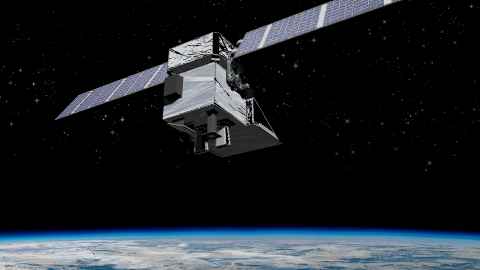Space Institute confirmed as partner in first Govt-funded space mission
23 April 2021
Te Pūnaha Ātea-Auckland Space Institute, based at the University of Auckland, will serve as Mission Control for a climate science satellite.

Te Pūnaha Ātea-Auckland Space Institute, based at the University of Auckland, has joined with Rocket Lab and a team of the country’s leading atmospheric and remote-sensing researchers on New Zealand’s first space mission funded by the Government.
Research, Science and Innovation Minister Dr Megan Woods announced the partners working with the New Zealand Space Agency and leading global environmental NGO the Environmental Defense Agency on the MethaneSAT mission at the Rocket Lab headquarters in Auckland today.
A team from Te Pūnaha Ātea-Auckland Space Institute will work with Rocket Lab to set up the mission control centre for the satellite, expected to provide valuable data and insight into methane emissions on a mission that could last for up to a decade in space.
The partnership between academia and industry is key to the growth of the New Zealand space sector, and we are delighted with this opportunity.
Te Pūnaha Ātea Director Professor Guglielmo Aglietti said,"This is great recognition of the capability to develop and operate space missions that we are establishing here in New Zealand. The partnership between academia and industry is key to the growth of the New Zealand space sector, and we are delighted with this opportunity.
“Hosting the Mission Operations Control Centre at the University of Auckland also enables educational activities and training programmes which will build important capability for the national space sector workforce.”
Professor Jim Metson the University Deputy Vice-Chancellor Research said, “The research has far reaching impacts in areas such as climate science, however one of the most exciting aspects of MethaneSAT is that we do not fully know the range of impacts this work will enable.”
Dr Peter Crabtree, General Manager Science, Innovation and International said: “The University of Auckland has a track record and reputation for successfully delivering important programmes like this, and I’m thrilled that they have been confirmed to be the permanent host of mission control. “This is an important opportunity for New Zealand to stamp our mark on global climate change science and research, and I can’t wait for the mission to launch.”
The mission, announced in 2019, will use the MethaneSAT satellite’s state-of-the-art capabilities to measure and map methane from oil and gas facilities and agriculture sources, which will provide the data to track and reduce those emissions.
Mission Operations Control Centre (MOCC) will be managed by Rocket Lab. Once it is running smoothly, it will be transferred to Te Pūnaha Ātea-Auckland Space Institute as the host.
A multi-institution, multi-disciplinary team of Aotearoa’s leading researchers in atmospheric science and remote sensing, led by Dr Sara Mikaloff-Fletcher of NIWA, will use the MethaneSAT satellite to demonstrate the potential to use satellites to accurately measure methane emissions from agriculture, both in New Zealand, and around the world. MethaneSAT is expected to be launched in late 2022.
Background
More information on the MethaneSAT mission can be found on the MBIE website
Mission Control Centre
Rocket Lab will initially establish and operate the Mission Operations and Control Centre, for approximately the first 12 months of the mission. University of Auckland’s Te Pūnaha Ātea-Auckland Space Institute will then take over the hosting of the Mission Control Centre. Rocket Lab will work closely with the University of Auckland during the transition, and will provide post-handover consultation.
Te Pūnaha Ātea -Auckland Space Institute is a multidisciplinary centre of expertise in space science and engineering at the University of Auckland, which aims to enhance the growth of the New Zealand space sector with world-leading applied research and development as well as educational programmes that shape the next generation of scientists and engineers. Institute academics and staff have deep expertise and decades of experience in delivering and operating successful space missions.
Media contact
Gilbert Wong | Research Communications Manager
M: 021 917942
E: gilbert.wong@auckland.ac.nz